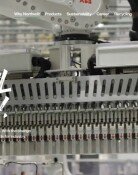Korea’s first space launch vehicle successfully lifts off
Korea’s first space launch vehicle successfully lifts off
Posted October. 22, 2021 07:30,
Updated October. 22, 2021 07:30
Korea’s first space launch vehicle (KSLV-2), also known as Nuri, lifted off on Thursday from the Naro Space Center in Goheung County, South Jeolla Province. The rocket soared to space, following the separation of the first-stage rocket, paring, and the second-stage rocket.
From design to development, production, and takeoff, the Nuri has been made with Korea’s homegrown rocket technology. In the history of space rocket development, only 28 percent of the vehicles succeeded in the first launch. The Naro has its first stage rocket that was built in Russia. As the space rocket succeeded in the third attempt, it was loaded with a dummy satellite in contingency for failure.
South Korea is a late mover in the global space race due to many constraints arising from complicated security environment surrounding the Korean Peninsula. In particular, the South Korea Ballistic Missile Range Guidelines shackled its development of not only military missiles but also the development of private spaceflights. Thankfully, the Missile Guidelines were amended one by one, paving the way for the nation to realize its space ambitions, were completely abolished in the ROK-US summit held in May. South Korea can now participate in the Artemis Accords, an American-led initiative for the Moon exploration.
The success of the Nuri will mark the first step for South Korea to become a leader in space exploration. The nation will begin developing various private and military satellites, a Korea-specific global positioning system (GPS), and space materials, components, and gear development. There is still a long way to go, as it is an industry requiring expensive costs and highly sophisticated technology. However, space is infinitely huge, offering infinite opportunities for growth; as such, we cannot afford to be reluctant.
The space industry has been expanding infinitely, from satellites and space launch vehicles to space tourism, air mobility, space Internet, and space debris treatment. Countries that are leading in the sector are fiercely competing to get ahead of others. The U.S., moving beyond national security and technological competition, has kicked off private space tourism, and China has achieved remarkable growth in space development by building its own space station, sending astronauts into space and its aircraft on Mars. Based on the achievements of the Nuri, South Korea should also begin in earnest its journey into space.
Headline News
- Kim Jong Un: Negotiations with U.S. have gone to the limit
- Yoon’s support rating remains at 20% for two weeks in a row
- SEC chair known for cryptocurrency regulations announces resignation
- Medical student scores 398 on CSAT, signaling ‘applications for reach schools’
- Noh Kyung-eun to play up to three more years with SSG







